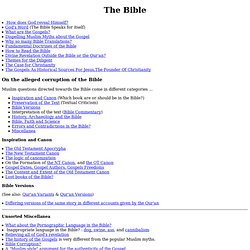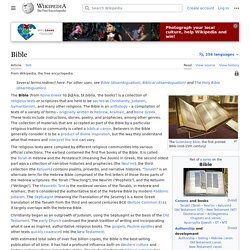

The Bible. How does God reveal Himself?

God's Word (The Bible Speaks for itself)What are the Gospels? Dispelling Muslim Myths about the GospelWhy so many Bible Translations? Fundamental Doctrines of the BibleHow to Read the BibleDivine Revelation Outside the Bible or the Qur'an? Themes for the DiligentThe Case for ChristianityThe Gospels As Historical Sources For Jesus,The Founder Of Christianity On the alleged corruption of the Bible Muslim questions directed towards the Bible come in different categories ... Inspiration and Canon The Old Testament ApocryphaThe New Testament CanonThe logic of canonizationOn the Formation of the NT Canon, and the OT CanonGospel Dates, Gospel Authors, Gospels FreedomsThe Content and Extent of the Old Testament CanonLost books of the Bible?
Bible Versions (See also: Qur'an Variants & Qur'an Versions) Differing versions of the same story in different accounts given by the Qur'an Unsorted Miscellanea What about the Pornographic Language in the Bible? Further links of interest: Bible Scholar: Half of New Testament ‘Forged’ Did you know: At least 11 of the 27 New Testament books are forgeries.The New Testament books attributed to Jesus’ disciples could not have been written by them because they were illiterate.Many of the New Testament’s forgeries were manufactured by early Christian leaders trying to settle theological feuds.

Those are the claims coming from one biblical scholar in a new book, “Forged.” The author is Bart D. Ehrman, a Wheaton College graduate and current professor at the University of North Carolina – Chapel Hill. “Bart D. One of Ehrman’s major targets is the Apostle Paul, who he says didn’t write 2 Timothy. Ehrman reserves most of his scrutiny for the writings of Paul, which make up the bulk of the New Testament. Bart Ehrman But Ehrman’s charges aren’t just limited to Paul: … He [also] challenges the authenticity of the Gospels of Matthew, Mark and John. Prominent fellow biblical scholar Ben Witherington — who authors a popular blog on faith — takes umbrage with Ehrman’s thesis. (H/T: David) FORGED: CHAPTERS SEVEN AND EIGHT—- COLLATERAL DAMAGE.
Bible. The Bible (from Koine Greek τὰ βιβλία, tà biblía, "the books") is a canonical collection of texts considered sacred in Judaism and Christianity.

There is no single "Bible" and many Bibles with varying contents exist.[1] The term Bible is shared between Judaism and Christianity, although the contents of each of their collections of canonical texts is not the same. Different religious groups include different books within their Biblical canons, in different orders, and sometimes divide or combine books, or incorporate additional material into canonical books. The Hebrew Bible, or Tanakh, contains twenty-four books divided into three parts: the five books of the Torah ("teaching" or "law"), the Nevi'im ("prophets"), and the Ketuvim ("writings"). Christian Bibles range from the sixty-six books of the Protestant canon to the eighty-one books of the Ethiopian Orthodox Church canon. Etymology An American family Bible dating to 1859. Development Professor John K. Timothy H. Hebrew Bible Torah Nevi'im.